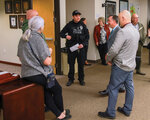
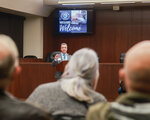
.jpg)
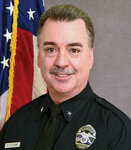
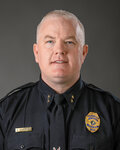

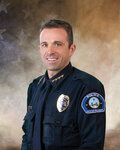
The five candidates for the City of Battle Ground police chief opening came together for an evening meet and greet at City Hall, Thursday, Dec. 9. The meet and greet was followed by a day of final interviews on Friday, Dec. 8.
Alisha Smith, City of Battle Ground communications manager, said the final decision could include only one candidate or a preliminary result of two or three candidates.
To help with the process, people who attended the meet and greet got to provide their impressions of each candidate by filling out a questionnaire they turned in to offer input as part of the selection process, the city stated in a pre-event release.
After contracting with GMP consultants to begin the recruitment process in August of this year, the search for the next police chief of Battle Ground turned national. The five candidates came from as far away as Alliance, Nebraska, with the most local coming from the Gresham Police Department.
The job opening officially takes place after Police Chief Mike Fort retires in January 2024.
Perry Phipps
Phipps began his public service career with the City of Carpinteria in California in 1984. He recently served as police chief for the City of Snoqualmie, Washington, from 2017 to this past July. Phipps holds a masters of arts degree in leadership and organizational studies and has earned a variety of certifications.
Community impressions
“I read that there’s a great sense of community here and kind of a small town feel,” Phipps said. “So I came down from the Seattle area [last] Friday night to go visit the community and sit down and meet at Starbucks and also go to the Christmas tree lighting event and stand aside but watched.”
Phipps added that he confirmed his research into Battle Ground.
“It just confirmed what I was reading, what I was told, and what I was hoping for,” Phipps said. “There is a great sense of community here, and that’s a big part of what I want to be involved in. The police department should be part of the community. … We’re not dividing, we are part.”
Safety and livability
“You have to have a plan, and you don’t know that until you get in that chair and then you develop a plan,” Phipps said. “So the first thing you have to do is make sure the department that you’re responsible for overseeing and managing is right. But the police chief isn’t just the police chief of that organization. The police chief is a very important part of the whole community.”
He added that being a helping part to different city departments as well as the local school districts go a long way in building a community’s trust with the police department.
“Those are the things that help with the community feeling safe because what that does is then you’re connected with the community and that’s part of the safety is then the community will reach out to you,” Phipps said.
Dennis Flynn
Flynn is currently the deputy chief of the Commerce City Police Department in Colorado, where he assists and supports the chief of police in the overall management of the police department. Prior to that, Flynn served with the Las Vegas Metropolitan Police Department, working his way through the ranks before he retired from that post as lieutenant in the robbery division. Flynn has a master of science in law enforcement and public safety and is also a graduate of the School of Police Staff and Command from Northwestern University.
Community Impressions
“It’s amazing, exceptionally supportive, but that’s why I came here. I did my homework,” Flynn said. “I didn’t want to apply to be in a place where the city wasn’t supportive of the police department. That was one of the huge draws that’s here in the community.”
Safety and livability
“You have to get the lay of the land. You have to see what the true issues are,” Flynn said. “But the answer is the problems will become apparent by just listening to the community people. … Once we hear what the problems are, rather than the chief try to come up with all the strategies of how to attack it, you pose that to the officers that are out there every day.”
He added that giving the officers the opportunity to combat community safety and livability problems will be a much more proactive solution for the community.
Sean O’Laughlin
O’Laughlin is currently the deputy chief/lieutenant with the Eastern Washington University Police Department in Cheney. O’Laughlin began his career in public service in 2008 with the U.S. Coast Guard Sector Puget Sound and also worked in other roles for the Coast Guard. O’Laughlin has earned three masters degrees in public safety, national security and public administration and is also a graduate of the FBI National Academy.
Community Impressions
“I can tell that the community really supports the police department,” O’Laughlin said. “All the people came here tonight and asked some great questions. I’ve been able to walk around and talk to a lot of people, which really tells you that this is a strong community that cares about the police department and the community.”
He added that policing is not about the police department but about the collaboration and everyone working together for a solution to the problems.
Safety and livability
“So the biggest thing as a new leader coming into a new department is it’s called the 90 days,” O’Laughlin said. “You don’t do anything for 90 days. All you’re doing for three months is understand the community’s needs. … But once you know what the issues are, that’s when you’re working with the city manager, city council, public works, school district, everybody.”
He added that working with different entities will help with brainstorming for solutions to implement as well as solutions that the community as a whole are on board with as O’Laughlin reiterated, “policing is not about just the police. It’s about everybody.”
Kevin Barton
Barton currently works as a lieutenant for the City of Gresham Police Department in Gresham. He is responsible for internal affairs and policies, according to the press release. Barton has served in law enforcement since 1997 and has occupied several leadership roles during his career, including lieutenant, detective sergeant, patrol bureau sergeant, deputy sheriff and corporal. Barton previously served in the U.S. Marine Corps. He holds a master of science from the University of Purdue and is a graduate from the FBI National Academy.
Community Impressions
“Battle Ground is a phenomenal community. It’s growing. It has great people. The business model that the city has decided to go with, making it the small-town feel, community focus, community centric has really been my draw here,” Barton said. “I’m a local resident here. I live in Hockinson. So this has always been a place for me and my family to go and hang out and enjoy.”
Safety and livability
“It’s going to be hard to tell you,” Barton said regarding strategies. “When you’re looking at the focus on community livability, it’s identifying what the problems are within a city. … But, really, it comes down to creating relationships between the police department and the community itself.”
Barton added that finding ways to integrate community feedback into how the department conducts law enforcement will go a long way to helping better the safety and livability of the community.
Philip Lukens
Lukens has more than 26 years of public service in law enforcement, serving as a corporal and sergeant. Most recently, he has served as the police chief for the City of Alliance Police Department in Alliance, Nebraska. Lukens has a bachelor of science degree in criminal justice as well as an array of various certifications, according to the city’s press release. In addition to his service in law enforcement, Lukens has held the title of senior pastor with the Carr Community Church.
Community Impressions
“I think my initial impressions are a sense of intimacy,” Lukens said. “The community cares about one another, and I find that very exciting because the people wanting to be active in this community and assist is a sign of people recognizing the civic responsibility within a community to make it great amongst one another.”
Lukens added that it’s the police department’s job to help only in certain areas to make the community as great as possible.
Safety and livability
“I think the big thing really is engaging the schools, really engaging the faith communities and nonprofit communities and people that already have a mission within the community, getting all those people in the same room to work together,” Lukens said.
He added that having everyone in the same room will help to tackle the community needs, and utilizing technology and community partnerships will help lead to a safer and cohesive community.